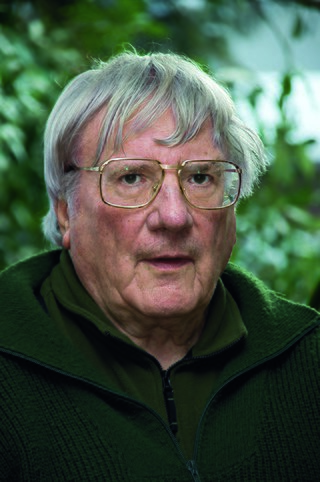
Christian Otto Josef Wolfgang Morgenstern was a German writer and poet from Munich. Morgenstern married Margareta Gosebruch von Liechtenstern on 7 March 1910. He worked for a while as a journalist in Berlin, but spent much of his life traveling through Germany, Switzerland, and Italy, primarily in a vain attempt to recover his health. His travels, though they failed to restore him to health, allowed him to meet many of the foremost literary and philosophical figures of his time in central Europe.
Sturm und Drang was a proto-Romantic movement in German literature and music that occurred between the late 1760s and early 1780s. Within the movement, individual subjectivity and, in particular, extremes of emotion were given free expression in reaction to the perceived constraints of rationalism imposed by the Enlightenment and associated aesthetic movements. The period is named after Friedrich Maximilian Klinger's play of the same name, which was first performed by Abel Seyler's famed theatrical company in 1777.
Johannes Wolfgang Zender was a German conductor and composer. He was the chief conductor of several opera houses, and his compositions, many of them vocal music, have been performed at international festivals.

Leopold van der Pals was a Danish/Dutch modernist composer who developed a personal and lyrical style in composing by involving elements of late romanticism, expressionism and impressionism.

Graham Waterhouse is an English composer and cellist who specializes in chamber music. He has composed a cello concerto, Three Pieces for Solo Cello and Variations for Cello Solo for his own instrument, and string quartets and compositions that juxtapose a quartet with a solo instrument, including Piccolo Quintet, Bassoon Quintet and the piano quintet Rhapsodie Macabre. He has set poetry for speaking voice and cello, such as Der Handschuh, and has written song cycles. His compositions reflect the individual capacity and character of players and instruments, from the piccolo to the contrabassoon.

Gestural Variations, Op. 43, is a trio composition by Graham Waterhouse in 1997 originally for oboe, bassoon and piano. Later versions are scored for clarinet, cello and piano (1999) and flute, cello and piano (2009).

"Der Handschuh" is a ballad by Friedrich Schiller, written in 1797, the year of his friendly ballad competition with Goethe. Other ballads written that year include Schiller's "Der Gang nach dem Eisenhammer", "Die Kraniche des Ibykus", "Der Ring des Polykrates", "Ritter Toggenburg", "Der Taucher", and Goethe's "Die Braut von Korinth", "Der Gott und die Bajadere", "Der Schatzgräber (Goethe)", "The Sorcerer's Apprentice".
Rudi Spring is a German composer of classical music, pianist and academic. He is known for vocal compositions on texts by poets and his own, and for chamber music such as his three Chamber Symphonies.
Siegfried Köhler was a German composer in the German Democratic Republic.

Graham Waterhouse, cellist and composer especially of chamber music, has written a number of song cycles. As a cellist, he has used string instruments or a Pierrot ensemble instead of the typical piano to accompany a singer. In 2003 he composed a first cycle of songs based on late poems by Friedrich Hölderlin. In 2016, he set nursery rhymes, excerpts from James Joyce, and texts by Shakespeare. In 2017, he wrote settings of poems by Irish female writers, and in 2022 a cycle of Buddhist texts for mezzo-soprano, cello and piano.

"Gesang der Geister über den Wassern" is a 1779 poem by Johann Wolfgang von Goethe (1749–1832). It may be best known in the English-speaking world through a musical setting of 1820–21 by Franz Schubert (1797–1828) as a part song for men's voices and low strings (D.714).
Reinhard Pfundt is a German pianist, composer and academic teacher at the University of Music and Theatre Leipzig. He wrote orchestral works, chamber music and songs, and was awarded prizes in the German Democratic Republic (DDR).

Variations for Cello Solo is a composition written by Graham Waterhouse in 2019. The variations depict characters of personalities. The cellist and composer performed the world premiere in Vienna in 2020. The composition was published by Schott the same year.
Rudolf Mors was a German composer.

Balladenjahr refers to the year 1797 in the history of German literature, in which many of the best-known ballads of Johann Wolfgang von Goethe and Friedrich Schiller originated within a few months, such as Goethe's "Der Zauberlehrling" and Schiller's "Der Ring des Polykrates", "Der Taucher", "Der Handschuh", "Der Gang nach dem Eisenhammer", "Ritter Toggenburg", and "Die Kraniche des Ibykus".

Wolfgang Schoor was a German composer, who wrote orchestral works, song cycles and chamber music and the music for numerous children's and documentary films and radio plays.

Alfred Koerppen was a German organist, music pedagogue, composer and academic teacher. He taught composition and music theory at the Hochschule für Musik und Theater Hannover from 1948 to 1991. His compositions focus on choral music with and without accompaniment, but he also wrote symphonies, chamber music and stage works.
Der Handschuh is a German lied written by Robert Schumann and published in 1850 as his Op.87. The song's text is the eponymous poem by German poet Friedrich Schiller, written in 1797 as part of a ballad competition alongside friend and colleague Johann Wolfgang von Goethe.








